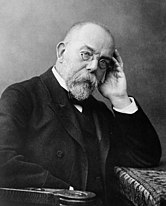Translations:Internal medicine/5/en
Etymology and historical development

The term internal medicine in English has its etymology in the 19th-century German term Innere Medizin. Originally, internal medicine focused on determining the underlying "internal" or pathological causes of symptoms and syndromes through a combination of medical tests and bedside clinical examination of patients. This approach differed from earlier generations of physicians, such as the 17th-century English physician Thomas Sydenham, known as the father of English medicine or "the English Hippocrates." Sydenham developed the field of nosology (the study of diseases) through a clinical approach that involved diagnosing and managing diseases based on careful bedside observation of the natural history of disease and their treatment. Sydenham emphasized understanding the internal mechanisms and causes of symptoms rather than dissecting cadavers and scrutinizing the internal workings of the body.